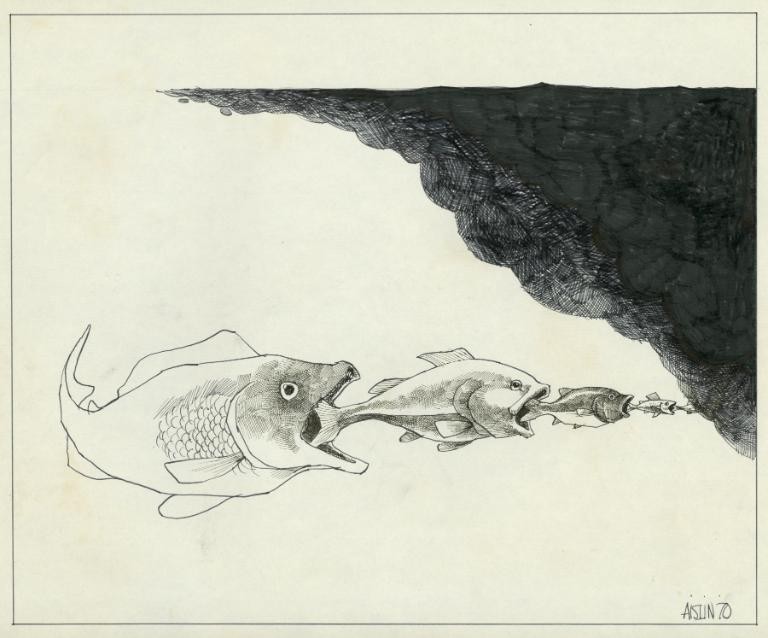Food Studies
 Credit: "Food Chain", Aislin, 1970, Object #M2006.142.36, McCord Museum.
Credit: "Food Chain", Aislin, 1970, Object #M2006.142.36, McCord Museum.
About their research
The Food Studies Working Group brings together faculty and graduate students with wide ranging expertise and interest in all manners of food, diet, and cuisine, from production to distribution, preparation, consumption, and disposal.
The pandemic has underscored the complexity of food systems and cultures. Amid the accelerating climate crisis, it has also brought to the foreground some of our unsustainable and maladaptive production and consumption patterns.
Our members are motivated to take advantage of this moment to mobilize the nexus of food research at Concordia, considering ways we can develop programming and, potentially, an interdisciplinary food studies curriculum with the ultimate goal of creating more resilient, healthy, diverse, and equitable food systems.
The richness and contributions of various research methods—experimental, qualitative, and creative—are all welcome as are the perspectives from reflective professionals in various sectors, including environmental and social justice organizations; food, agriculture and restaurant industries; and public health and policy makers.
Working group members tackle a wide range of issues and challenges:
- Mapping networks of urban food landscapes (for example, agriculture, retail, restaurants, waste management);
- Using interdisciplinary methods to critically analyse relationships between eating and being from a variety of perspectives including historical transformations, social justice, nutritional science, social media, critical materiality, and research creation;
- Using approaches at the intersection of socio-cultural studies and business studies to explore sustainable and healthy food lifestyles, thereby taking a holistic approach to health and food citizenship;
- Using storytelling, cooking, recipe-sharing and other modes of research-creation to diversify approaches to sustainable food cultures beyond text-, survey- or experimentation-based research;
- Developing cultural awareness of food and eating amongst caregivers, especially with regards to marginalized individuals and communities;
- Envisioning new directions for interdisciplinary food studies collaborations at Concordia.
Co-directors
- Jordan LeBel, Department of Marketing, John Molson School of Business
- Anya Zilberstein, Department of History, Faculty of Arts and Science
Coordinator
- Marie-Ève Ducharme, INDI Doctoral Candidate
If you are interested in joining this working group, contact Marie-Éve Ducharme at marieeve.ducharme@concordia.ca.
Key questions
- What emergent forms of research and pedagogy can scholars of food from disparate fields of study (marketing, design, engineering, nutritional science, history, sociology/anthropology, geography, environmental studies, communication studies) generate?
- What unique insights do collaborative, interdisciplinary studies of food production, consumption, and waste offer for understanding the global climate crisis?
- How might a study of food security be better understood if explored through multidisciplinary engagement?
- How do we turn food consumers into informed food citizens, and then empower and mobilize them to activate this knowledge in their communities?
Group members
- Erik Chevrier, Sociology & Anthropology, Faculty of Arts & Science
- Satoshi Ikeda, Sociology & Anthropology, Faculty of Arts & Science
- Norma Joseph, Religions & Cultures, Faculty of Arts & Science
- Christine Jourdan, Sociology & Anthropology, Faculty of Arts & Science
- Jordan LeBel, Department of Marketing, John Molson School of Business
- Elizabeth Miller, Communication Studies, Faculty of Arts & Science
- Alan Nash, Geography, Planning and the Environment, Faculty of Arts & Science
- Rhona Richman-Kenneally, Design & Computation Arts, Faculty of Fine Arts
- Sylvia Santosa, Health, Kinesiology and Applied Physiology
- Anya Zilberstein, History, Faculty of Arts & Science
- Marie-Ève Ducharme, INDI Ph.D. Candidate
- Ali Kenefick, INDI Ph.D. Candidate
- Pamela Tudge, INDI Ph.D. Candidate
